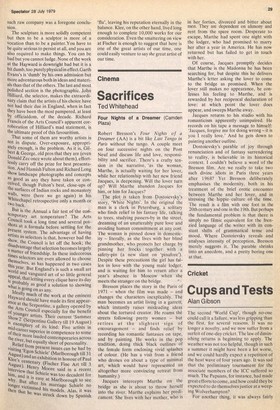Cinema
Sacrifices
Ted Whitehead
Four Nights of a Dreamer (Camden Plaza) Robert Bresson's Four Nights of a Dreamer (AA) is a bit like Last Tango in Paris without the tango. A couple meet on four successive nights on the Pont Neuf and discuss life and love, responsibility and sacrifice. There's a crafty tension in the narrative, as the woman, Marthe, is actually waiting for her lover, while her relationship with her new friend Jacques, is deepening. Will the lover turn up? Will Marthe abandon Jacques for him, or him for Jacques?
The plot is taken from Dostoievs.ky's story, 'WhiteNights', In the original the man is a clerk in Petersburg, a solitary who finds relief in his fantasy life, talking to trees, studying passers-by in the street, dreaming of an unutterably pure love and avoiding human committment at any cost. The woman is pinned down in domesticity — literally, as she lives with her blind grandmother, who protects her charge by pinning her frocks together with a safety-pin (a new slant on `pinafore'). Despite these precautions the girl has fallen in love with the young male lodger, and is waiting for him to return after a year's absence in Moscow when she meets the stranger on the bridge.
Bresson places the story in the Paris of 1971 — when the film was made — and changes the characters inexplicably. The man becomes an artist living in a garrett, which instantly raises misleading ideas about the tortured creator. He roams the streets following pretty women — but retires at the slightest -sign of encouragement — and finds relief by recording his romantic fantasies on tape, and by painting. He works in the pop tradition, doing thick black outlines of the female form enclosing vivid splashes of colour. (He has a visit from a friend who drones on about a type of minimal art, which would have represented an altogether more convincing retreat from humanity.) Jacques intercepts Marthe on the bridge as she is about to throw herself into the river, Marthe explains her predicament. She lives with her mother, who is in her forties, divorced and bitter about men. They are dependent on alimony and rent from the spare room. Desperate to escape, Marthe had spent one night with the lodger, who had promised to marry her after a year in America. He has now returned but has failed to get in touch with her.
Of course, Jacques promptly decides that Marthe is the Madonna he has been searching for, but despite this he delivers Marthe's letter asking the lover to come to the bridge as promised. When the lover still makes no appearance, he confesses his feeling to Marthe, and is rewarded by her reciprocal declaration of love: at which point the lover does appear, and sweeps Marthe away.
Jacques returns to his studio with his romanticism apparently unimpaired. He records on his tape a message to himself: 'Jacques, forgive me for doing wrong — it is you I really love.' And he gets down to painting another outline.
Dostoievsky's parable of joy through renunciation and of fantasy surrendering to reality, is believable in its historical context. I couldn't believe a word of the Bresson film. Are we really to take two such divine idiots in Paris three years after 1968? Yet Bresson deliberately emphasises the modernity, both in his treatment of the brief erotic encounter between Marthe and her lover, and in stressing the hippie culture of the time.
The result is a film with one foot in the 20th century and one in the 19th. But perhaps the fundamental problem is that there is simply no filmic equivalent for the frenzied language of the writer with its con stant shifts of grammatical tense and mood. Where Dostoievsky reveals and analyses intensity of perception, Bresson merely suggests it. The parable shrinks into an anecdote, and a pretty boring one at that.






































 Previous page
Previous page